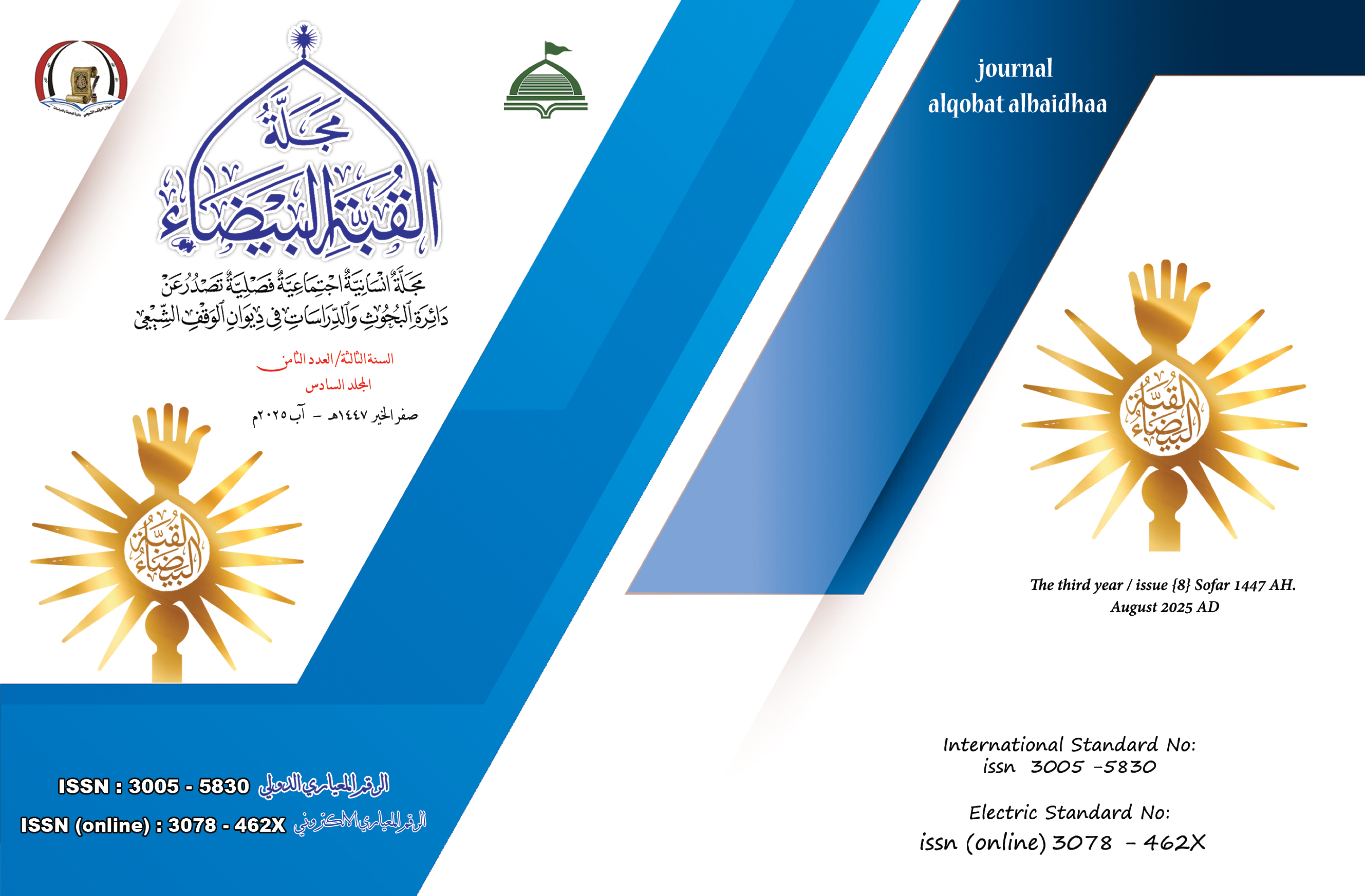Abstract
Abstract:
This research addresses a delicate and important jurisprudential topic: testimony regarding one›s own actions and its rulings in Islamic jurisprudence. This refers to a person giving testimony regarding an incident in which he was a direct party, or which occurred in private with no one else present, without being called to account at the time. This issue is one of the issues in which the objectives of Sharia are intertwined, related to preserving rights, preventing accusations, and achieving justice. This study came to fill a scientific gap in this regard, by establishing the issue with a jurisprudential basis, and analyzing its most prominent jurisprudential applications as mentioned in the books of the eight schools of thought, then balancing the statements of the jurists, while clarifying the preferred statement in each issue with its evidence and the reason for its preference. The research consisted of two main sections: The first section: I addressed the theoretical framework of testimony in terms of its definition, evidence, witness conditions, and the ruling on its performance. The second section: It included an applied study of eight prominent models in which the issue of testimony about oneself appears, such as testimony about breastfeeding, marriage, and others. The research concluded that testimony about one›s own action is neither absolutely acceptable nor rejected, but rather its rulings differ according to the nature of the act testified to, the character of the witness, and the extent of the presence of evidence or a valid Sharia interest.
This research addresses a delicate and important jurisprudential topic: testimony regarding one›s own actions and its rulings in Islamic jurisprudence. This refers to a person giving testimony regarding an incident in which he was a direct party, or which occurred in private with no one else present, without being called to account at the time. This issue is one of the issues in which the objectives of Sharia are intertwined, related to preserving rights, preventing accusations, and achieving justice. This study came to fill a scientific gap in this regard, by establishing the issue with a jurisprudential basis, and analyzing its most prominent jurisprudential applications as mentioned in the books of the eight schools of thought, then balancing the statements of the jurists, while clarifying the preferred statement in each issue with its evidence and the reason for its preference. The research consisted of two main sections: The first section: I addressed the theoretical framework of testimony in terms of its definition, evidence, witness conditions, and the ruling on its performance. The second section: It included an applied study of eight prominent models in which the issue of testimony about oneself appears, such as testimony about breastfeeding, marriage, and others. The research concluded that testimony about one›s own action is neither absolutely acceptable nor rejected, but rather its rulings differ according to the nature of the act testified to, the character of the witness, and the extent of the presence of evidence or a valid Sharia interest.
Keywords
action
comparative.
jurisprudence
Keywords: testimony
models
self
Abstract
المستخلص:
يتناول هذا البحث موضوعًا فقهيًا دقيقًا ومهمًّا، وهو الشهادة على فعل النفس وأحكامها في الفقه الإسلامي، ويُقصد بها: أن يُدلي الإنسان بشهادته على واقعة كان هو طرفًا مباشرًا فيها، أو صدرت منه، أو حصلت في خلوة لا يحضرها غيره، دون أن يُستشهد عليه في حينها, وتُعد هذه المسألة من المسائل التي تتداخل فيها مقاصد الشريعة المتعلقة بحفظ الحقوق، ومنع التهمة، وتحقيق العدالة، وقد جاءت هذه الدراسة لتسدّ ثغرة علمية في هذا الباب، وذلك من خلال تأصيل المسألة تأصيلًا فقهيًا، وتحليل أبرز تطبيقاتها الفقهية كما وردت في كتب المذاهب الثمانية ، ثم الموازنة بين أقوال الفقهاء مع بيان القول الراجح في كل مسألة بدليلها ووجه ترجيحها, وقد تكوَّن البحث من مبحثين رئيسين: المبحث الأول: تناولت فيه الإطار النظري للشهادة من حيث تعريفها، وأدلتها، وشروط الشاهد ، وحكم أدائها اما المبحث الثاني: فتضمّن دراسة تطبيقية لثمانية نماذج بارزة تظهر فيها مسألة الشهادة على النفس، كالشهادة على الرضاع، والنكاح وغيرهما, وخلص البحث إلى أن الشهادة على فعل النفس ليست على إطلاقها مقبولة ولا مردودة، بل تختلف أحكامها باختلاف طبيعة الفعل المشهود عليه، وصفة الشاهد، ومدى وجود قرائن أو مصلحة شرعية معتبرة.
يتناول هذا البحث موضوعًا فقهيًا دقيقًا ومهمًّا، وهو الشهادة على فعل النفس وأحكامها في الفقه الإسلامي، ويُقصد بها: أن يُدلي الإنسان بشهادته على واقعة كان هو طرفًا مباشرًا فيها، أو صدرت منه، أو حصلت في خلوة لا يحضرها غيره، دون أن يُستشهد عليه في حينها, وتُعد هذه المسألة من المسائل التي تتداخل فيها مقاصد الشريعة المتعلقة بحفظ الحقوق، ومنع التهمة، وتحقيق العدالة، وقد جاءت هذه الدراسة لتسدّ ثغرة علمية في هذا الباب، وذلك من خلال تأصيل المسألة تأصيلًا فقهيًا، وتحليل أبرز تطبيقاتها الفقهية كما وردت في كتب المذاهب الثمانية ، ثم الموازنة بين أقوال الفقهاء مع بيان القول الراجح في كل مسألة بدليلها ووجه ترجيحها, وقد تكوَّن البحث من مبحثين رئيسين: المبحث الأول: تناولت فيه الإطار النظري للشهادة من حيث تعريفها، وأدلتها، وشروط الشاهد ، وحكم أدائها اما المبحث الثاني: فتضمّن دراسة تطبيقية لثمانية نماذج بارزة تظهر فيها مسألة الشهادة على النفس، كالشهادة على الرضاع، والنكاح وغيرهما, وخلص البحث إلى أن الشهادة على فعل النفس ليست على إطلاقها مقبولة ولا مردودة، بل تختلف أحكامها باختلاف طبيعة الفعل المشهود عليه، وصفة الشاهد، ومدى وجود قرائن أو مصلحة شرعية معتبرة.
Keywords
الكلمات المفتاحية: شهادة
فعل
فقه
مقارن .
نفس
نماذج
